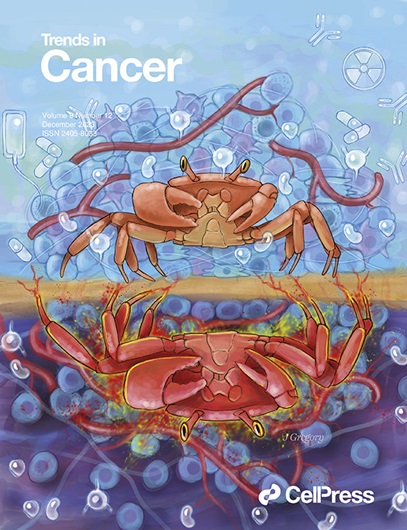进入癌症血管:重新审视古老的标志。
IF 14.3
1区 医学
Q1 ONCOLOGY
引用次数: 0
摘要
诱导血管生成是典型的癌症标志,它的诞生源于人们长期以来的一种观念,即只有形成新的血管,肿瘤才能生长。基于这一前提,人们试图通过治疗手段抑制血管生成以控制肿瘤生长,但效果不如预期。部分原因是原发性和转移性肿瘤可以在没有血管生成的情况下生长。非血管生成癌症及其利用正常血管的机制(称为 "血管共用")的发现为癌症生物学开辟了一个新领域。因此,癌症的标志 "诱导血管生成 "已被修改为 "诱导或利用血管"。本文章由计算机程序翻译,如有差异,请以英文原文为准。
Accessing the vasculature in cancer: revising an old hallmark.
The classic cancer hallmark, inducing angiogenesis, was born out of the long-held notion that tumours could grow only if new vessels were formed. The attempts, based on this premise, to therapeutically restrain angiogenesis in hopes of controlling tumour growth have been less effective than expected. This is partly because primary and metastatic tumours can grow without angiogenesis. The discovery of nonangiogenic cancers and the mechanisms they use to exploit normal vessels, called 'vessel co-option,' has opened a new field in cancer biology. Consequently, the cancer hallmark, 'inducing angiogenesis,' has been modified to 'inducing or accessing vasculature.'
求助全文
通过发布文献求助,成功后即可免费获取论文全文。
去求助
来源期刊

Trends in cancer
Medicine-Oncology
CiteScore
28.50
自引率
0.50%
发文量
138
期刊介绍:
Trends in Cancer, a part of the Trends review journals, delivers concise and engaging expert commentary on key research topics and cutting-edge advances in cancer discovery and medicine.
Trends in Cancer serves as a unique platform for multidisciplinary information, fostering discussion and education for scientists, clinicians, policy makers, and patients & advocates.Covering various aspects, it presents opportunities, challenges, and impacts of basic, translational, and clinical findings, industry R&D, technology, innovation, ethics, and cancer policy and funding in an authoritative yet reader-friendly format.
 求助内容:
求助内容: 应助结果提醒方式:
应助结果提醒方式:


